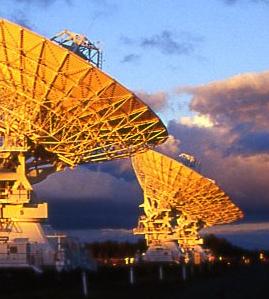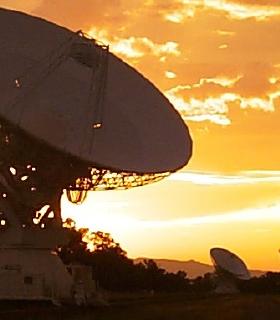 |
ATCA Science Day
ATNF Lecture Theatre
|
 |
The Australia Telescope Compact Array (ATCA) is one of a few radio interferometers in the world. It covers an extraordinary frequency range from approx. 1 to 110+ GHz (in seven bands), provides full polarisation capability, dual-frequency operation as well as time binning. The 6 x 22-m dishes can be configured into very compact hybrid arrays (< 75m), extended arrays (< 6km), and linked into the Long Baseline Array (LBA). --- The ATCA has been, and continues to be, a front rank scientific instrument.
Its scientific output (papers in ADS, by citations) is compelling and diverse, resulting from both first-class instrumentation and dedicated users from around the world. ATCA projects range from short flux monitoring programs, 12-h full synthesis mapping to large-scale line and continuum surveys. The impact of the science from the ATCA can be judged through, for example, publications and their citation rates which are among the highest from any radio telescope world wide (Trimble & Zaich 2006, Trimble & Ceja 2007).
As we move towards The Australian Square Kilometre Array Pathfinder (ASKAP), Phase I of the SKA and ultimately the full SKA, we need to determine the role that the ATCA will play into the future. --- The "ATNF Future Operations - Community Feedback" highlights a number of issues under discussion.
The "ATCA Science Day" will focus on the science which can be done with the ATCA over the next 5 - 10 years, both prior to the advent of ASKAP and during ASKAP operations. The latest upgrade - the new Compact Array Broad-Band correlator (CABB) - will play a huge role in the near to long-term future.
Please note the excellent talks given at
|
|
Other meetings:
|
|
| Date: | Wednesday 11 June 2008, 09:30 to 17:00h |
|---|---|
| Venue: | Lecture Theatre, ATNF Marsfield (directions, accommodation) |
| Teleconference: | A tele/video conference line will be available at 02 6246 3160 for remote participation |
Program
|
11 June 2008 |
|||
|---|---|---|---|
| 09:30 | 10:00 | Coffee/Tea | |
| Session 1 | (chair: Attila Popping) | ||
| 10:00 | 10:05 | Brian Boyle | Welcome |
| 10:05 | 10:20 | Phil Edwards | The Australia Telescope Compact Array: 20 years young |
| 10:20 | 10:40 | Baerbel Koribalski | The ATCA in 2012 |
| 10:40 | 11:00 | John Dickey | The ATCA in the ALMA era, star formation tracers at cm-waves |
| 11:00 | 11:20 | Lister Staveley-Smith | Deep ATCA HI Surveys and the Path to ASKAP |
| 11:20 | 11:35 | Small Break | |
| Session 2 | (chair: Tony Wong) | ||
| 11:35 | 11:50 | Kate Brooks | Community outlook for Millimetre ATCA Projects |
| 11:50 | 12:05 | Michael Burton | Future Millimetre Capabilities - what Australia needs |
| 12:05 | 12:15 | Maria Cunningham | Detecting New complex Organic Molecules in the Interstellar Medium |
| 12:15 | 12:30 | Andrew Walsh | Massive accretion disks: ATCA's potential for deep impact |
| 12:30 | 13:30 | Lunch | |
| Session 3 | (chair: Minnie Mao) | ||
| 13:30 | 13:50 | Ilana Feain | The formation and evolution of distant, massive, red, dead, active galaxies |
| 13:50 | 14:10 | Ron Ekers | Detecting the Epoch of (Re-)Combination |
| 14:10 | 14:30 | Bryan Gaensler | Broadband Polarimetry with the ATCA |
| 14:30 | 14:45 | Maxim Voronkov | Maser studies with ATCA |
| 14:45 | 15:00 | Tasso Tzioumis | Science with the LBA |
| 15:00 | 15:30 | Coffee/Tea | |
| Session 4 | (chair: Ann Mao) | ||
| 15:30 | 15:50 | Elaine Sadler | AGN and galaxy evolution - the case for wide ATCA surveys |
| 15:50 | 16:10 | Andrew Hopkins | The future of deep surveys with the ATCA |
| 16:10 | 16:25 | J-P Macquart | Sgr A* & transient physics beyond the late naughties |
| 16:25 | 16:40 | Stuart Ryder | Radio monitoring of supernovae with ATCA + CABB |
| 16:40 | 17:00 | Robert Braun | Discussion & Summary |
Registration
All are welcome to attend and participate in the ATCA Science Day. There is no registration fee for the meeting which will be held in the Lecture Theatre on the Marsfield site of the ATNF. Morning tea, lunch and afternoon tea will be provided for all participants.
Speakers
All speakers should email their contributions to at_meetings@atnf.csiro.au (subject: ATCA-Science-Day) before the meeting starts. This will allow people from remote locations to access your talk.
Thank You !
A big "THANK YOU !" to all speakers, session chairs and, of course, all participants to the meeting. You were great.
We plan to put all talks (if the speakers agree) online, but this may take a little while. Thanks for your patience.
Organisers
- Bärbel Koribalski (Baerbel.Koribalski AT csiro.au)
- Ilana Feain (Ilana.Feain AT csiro.au)
